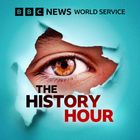
The History Hour
Jun 18, 2022
In 2009, Rob Hamill testified in the trial of Comrade Duc, who ran the notorious Tuol Sleng prison during the Cambodian genocide. Josephine McDermott spoke to him.
It is 50 years since Kim Phuc's village in Vietnam was bombed with napalm. The photograph of her, running burned from the attack, became one of the iconic images of the Vietnam War. Kim Phuc talks to Christopher Wain, the man who helped save her.
In 2001 a violent, sectarian dispute took place outside Holy Cross Primary School in Belfast. Loyalist protesters tried to block the school run for Catholic pupils and their parents for months. Rachel Naylor spoke to one of the parents, Elaine Burns.
This year is the 100th anniversary of Ulysses by James Joyce, one of the most influential novels of the 20th Century. Ulysses is the story of one day in the life of a young Irishman in Dublin; that day, June 16th, is now known as Bloomsday. To mark Bloomsday, Simon Watts brought together the memories of some of Joyce’s friends. The programme was first broadcast in 2012.
In 1985, a unique High School opened in New York to provide a safe environment for LGBT students needing specialised education. The publicly-funded Harvey Milk High School was founded by former social worker, Steve Askinazy. Alex Collins talked to Steve Askinazy.
(Photo: Kang Kek lew (Comrade Duc) as Director of Tuol Sleng Prison, c.1976-8. Credit: Getty images)

